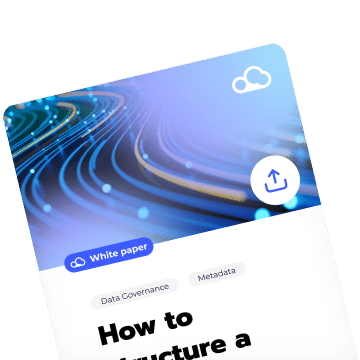Has your organization kept pace with the seismic shift in data governance strategy this year?
2023 marked a decisive departure from heavy reliance on AI technology in data governance to a human-centric approach. This renewed emphasis focused on the people-centric aspects of guiding and overseeing data governance and marked a shift toward a much-needed reevaluation and repositioning of resources.
Given the monumental advancements in AI and machine learning capabilities, why are companies seeing this sudden and systemic change of heart? In 2023, organizations have come to recognize the irreplaceable role of people in guiding and managing data governance.
The human imperative in data governance
Human involvement is fundamental to a responsive data governance program. Humans bring an unmatched depth of context, ethical insight, and versatility, surpassing what AI alone can offer. Additionally, humans can interpret delicate nuances and apply ethical judgment, an essential skill in navigating the complex landscape of data governance.
In contrast, organizations leaning exclusively on technology risk significant missteps. Sole reliance on AI and automated systems leads to inflexibility and the absence of ethical thinking. This gap is particularly striking when unexpected challenges or complex ethical dilemmas surface. It’s vital to strike the proper balance between man and machine.
Neglecting the human element in data governance doesn’t just weaken your strategy; it risks its outright failure.
Uniquely human qualities
Several uniquely human qualities have proved irreplaceable for effective data governance. These key attributes include:
- Multifaceted human involvement: People apply contextual understanding to data, leading to relevant and actionable outcomes. Ethical decision-making is a solely human ability.
- Key in change management: Humans can navigate the complexities of organizational change, especially in data governance. Understanding human behavior and organizational dynamics is critical for influencing the adoption of new ideas.
- Building data literacy: Developing data literacy across an organization requires training and motivating team members to understand, interpret, and use data effectively. People must lead and champion this instruction.
- Inherent adaptability: Humans’ ability to adapt is vital in meeting the challenges of evolving strategies, technologies, and regulations. Adaptability is integral to keeping governance relevant and effective.
Integrating human insight and expertise into data governance practices is a fundamental necessity. Humans’ ability to understand, adapt, and ethically guide data governance is irreplaceable. A human-centric approach makes data governance more effective, responsive, and ethical.
The perils of human absence in data governance
While a reliance on AI and machine learning has advanced technical aspects of data governance, it has created significant gaps in areas requiring human insight. Without human insight, governance frameworks struggle to adapt and remain relevant due to:
- Limited contextual understanding: AI and automated systems fall short in interpreting the broader implications of regulatory changes. Without human aid, they can’t assess how new regulations might impact existing processes and strategies.
- Rigidity in adjustment: Automated systems lack the creative and strategic thinking needed to adapt to new scenarios. This limitation renders them inadequate for responding to unexpected regulatory changes.
- Inability to anticipate future trends: While AI effectively analyzes existing patterns, it falls short in predicting potential regulatory shifts. This limitation can leave governance strategies unprepared for future compliance challenges.
- Overlooking ethical and compliance nuances: Automated systems cannot grasp ethical and compliance complexities. As a result, governance practices may be technically compliant but fail to meet evolving ethical standards.
- Ineffective stakeholder communication: Influence and credibility weaken without a continual human presence in governance roles. This absence becomes most evident during stakeholder outreach to resolve governance issues. A lack of established rapport can delay or jeopardize potential resolutions.
The real-world impact
An over-reliance on technology poses sizable risks. The following are examples underscoring the importance of human oversight in data governance:
- Biased algorithmic lending in financial institutions: AI-backed lending decisions have been accused of bias in loan approval processes. Unsupervised algorithmic decision-making can lead to unfair treatment of certain demographic groups. Human oversight is needed to identify and correct these unintended biases.
- Healthcare data management: AI systems, when analyzing patient data, can overlook critical patient-specific factors. Active oversight by human healthcare professionals is necessary for providing accurate and ethical patient care.
- Automated hiring tools in HR: When trained on non-diverse datasets, AI-driven resume screening and candidate selection tools can inadvertently introduce biases. Human HR professionals are essential to fairness and diversity in hiring.
- Ethical use of customer data in tech companies: Tech companies have been scrutinized for unethical targeting practices, particularly those managing large volumes of personal data. These concerns have centered on the misuse of personal data for targeted advertising. Human oversight is needed to navigate these ethical complexities. Data practices must be tailored to and aligned with privacy standards and public expectations.
Human involvement is crucial in addressing ethical, fairness, and privacy concerns. Governance strategies must be technically sound but also ethically responsible.
Strategies for empowering people-centric data governance
When using a people-centric approach to data governance, organizations must adopt methodologies that:
- Emphasize inclusivity: Involving diverse stakeholders provides comprehensive, adaptable strategies.
- Encourage collaboration: Promoting cross-departmental collaboration produces shared ownership and effective governance.
- Build data literacy: Boosting data literacy leads to informed data governance participation.
These strategies foster a shared and uniformly supported governance program.
People-centric methodologies
Collaboration lays the groundwork for new methodologies that effectively integrate people-centric practices.
People-centric processes include:
- Inclusive frameworks: Including stakeholders from diverse departments leverages many perspectives. Workshops and brainstorming sessions create ownership and commitment to these initiatives.
- Strengthened data literacy: Organization-wide data literacy programs educate employees on the importance of data governance. Data literacy builds support for the responsible use of data and a culture that nurtures it.
- Collaborative decision-making: Establishing governance committees with diverse voices promotes a culture of collective decision-making. Regular meetings and digital collaboration tools make governance an interactive process.
- A culture of data stewardship: Cultivating personal responsibility for data quality and security strengthens data handling and privacy adherence. Recognizing individual contributions to data governance reinforces productive behaviors.
- Transparency and open communication: Clear communication about governance processes and decisions provides transparency. Feedback channels allow employees to express their views on governance matters.
Many organizations have developed governance models that are technically sound. Yet, these models must also be inclusive, adaptable, and human-centered.
People at the heart of data governance
The future of data governance is founded on human involvement. It balances technological advancements with people driving these technologies and their ethical implications. As we envision the future of data governance, several key areas emerge where human involvement will be pivotal for success:
- Human-centric data governance: Future trends indicate a more robust integration of human insight. Oversight roles will confirm that human values and ethics guide data management systems.
- Ethical considerations: Data governance will increasingly focus on ethical issues: privacy, data rights, and algorithmic fairness. These issues necessitate a human-centric approach to align with societal norms and moral standards.
- Balancing technology and human expertise: Striking the right balance between technological capabilities and human judgment is critical. Human expertise is vital for the meaningful and ethical application of technical insights.
- Fostering a people-centric future: Organizations must prepare for a people-centric future in data governance. Training their workforce in ethical decision-making, critical thinking, and emotional intelligence are the keys to this future.
The future of data governance places people at the forefront of technological advancements. People design systems that meet technical standards but resonate with human values, resulting in responsible and ethical data governance.
Conclusion
This year marked a significant shift from AI-dominated data governance to a more balanced, people-centric approach. This configuration leverages human insight, ethical judgment, and organizational collaboration.
Central to this transformation is the impact on change management and data literacy. Effective data governance requires technological acumen and a data-literate workforce. An intense focus on data literacy enables organizations to develop technically sound, resilient, yet flexible data governance strategies.
By repositioning people at the center of data governance strategies, organizations can navigate the complexities of data management with an optimal blend of technological prowess and human wisdom. In doing so, they create a data governance framework that is effective, ethical, and equipped to meet today’s and tomorrow’s challenges.
Still have questions about transforming data into value for your organization? Turn to DataGalaxy to create your company’s data lineage mapping, develop a standardized business glossary, and much more! Check our calendar and select a date that works for you. Jumpstart your free 15-day platform trial access & start making the most of your data today!





